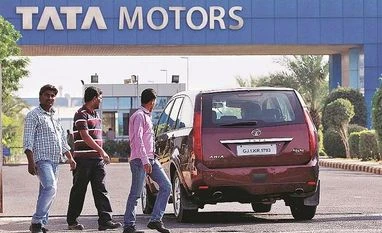Tata Motors reported better-than-expected earnings for the September quarter, with improvement in the operational performance at Jaguar Land Rover, its Britain-based luxury vehicle arm.
Loss at the India business deepened, however, with poor commercial vehicle (CV) and passenger vehicle (PV) sales.
The company’s American Depository Receipts rose 10 per cent on Friday at the time of going to press. The share price closed at Rs 126.95 on the BSE exchange, down 4.9 per cent. The earnings were reported after markets closed for the day.
Net loss at the consolidated entity narrowed to Rs 216.6 crore in the three months to September, from Rs 1,048.8 crore in the same period a year before. Net revenue dropped nine per cent in the period to Rs 65,432 crore. Driven by an improvement in JLR’s operational metrics, earnings before interest, tax, depreciation and amortisation (Ebitda) in the quarter rose 250 basis points (bps) to 12.4 per cent, the highest in 16 quarters.
“Healthier than expected numbers, driven by strong JLR results,” went a research note from ICICI Direct. “The real highlight of the quarter was excellent performance on the margin front at JLR and, consequently, at the consolidated level.”
Net revenue at JLR increased eight per cent year-on-year to £6,086 million, while Ebitda went up sharply by 480 bps to 13.8 per cent.
The latter improvement was led by an increase in China sales, better sales mix, favourable foreign exchange and cost saving measures, said P B Balaji, chief financial officer at Tata Motors.
“It was a quarter of well-rounded performance at JLR. We are confident of delivering the plans,” he said, adding that ahead of the £2.5 billion by 2020 targeted under the cost saving programme called Project Charge, £2.2 billion had been delivered to date. Savings under the project is being targeted under three heads — investment, working capital, and costs and profit.
China is one of JLR's most important markets in terms of volume and profit. During the quarter, deliveries to customers there rose 24.2 per cent, year-on-year. The company expects volumes to pick up further as the broader passenger vehicle market recovers. JLR’s overall sales (all markets) saw a marginal 0.7 per cent decline to 129,000 units over the same quarter a year before.
Meanwhile, the trouble deepened for the India business. The entity incurred a loss of Rs 1,270 crore prior to tax for the quarter, against a profit before tax of Rs 150 crore in the year-before period.
Poor demand for CVs and PVs forced the company to take an inventory correction worth Rs 3,400 crore. This in turn dragged down revenue for the standalone entity by 44 per cent, to Rs 10,000 crore from Rs 17,759 crore.
The total volume, including export, for the domestic operation fell 44 per cent to 106,349 units from the corresponding quarter. The growth was impacted by subdued demand, liquidity stress and low freight availability for cargo operators, and general economic slowdown, said the company in the investor presentation.
Equity allotment to Tata Sons
Tata Motors is to raise equity through a preferential allotment of shares to holding company Tata Sons. The board of directors has approved the raising of Rs 6,500 crore through preferential allotment of ordinary shares and warrants to the promoter.
This will deleverage the balance sheet, paring debt of the standalone entity and allowing the business to focus on long-term strategy, besides rating support, said Tata Motors.
At the end of September, net debt of the standalone entity was Rs 20,000 crore. The warrants will be convertible into ordinary shares after 18 months, with a fourth of the consideration to be brought in at the time of allotment. The issue price will be Rs 150, a premium of 11 per cent to the average closing price of the past five days.
Unlock 30+ premium stories daily hand-picked by our editors, across devices on browser and app.
Pick your 5 favourite companies, get a daily email with all news updates on them.
Full access to our intuitive epaper - clip, save, share articles from any device; newspaper archives from 2006.
Preferential invites to Business Standard events.
Curated newsletters on markets, personal finance, policy & politics, start-ups, technology, and more.
)